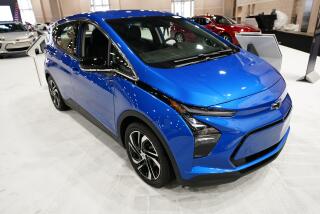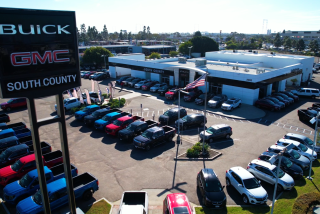Porsche Shifts Into First in Vehicle Quality Survey
- Share via
Porsche of Germany powered into the passing lane, for the first time landing the top spot in a widely watched auto quality report issued Wednesday.
The maker of expensive sports cars and luxury sport utility vehicles rose in the annual J.D. Power & Associates rankings, analysts said, after addressing customer complaints and adding a highly rated compact model.
The survey was notable as well for what didn’t change, as Toyota Motor Corp. of Japan and the rising Hyundai Motor Co. of South Korea again scored high marks for overall dependability and in individual vehicle categories.
Models from Toyota’s mainstream brand and Lexus luxury line topped 11 of 19 categories, including compact car (Corolla), mid-size car (Camry) and six classes of premium cars and trucks.
In its report, Power found that Porsche was the top-scoring brand for model year 2006, with 91 problems per 100 vehicles. The automaker was followed by Lexus (93), Hyundai (102) and Toyota (106). The industry average was 124.
Among U.S. brands, General Motors Corp.’s Cadillac ranked highest, tied at No. 7. Vehicles from GM, Ford Motor Co. and Chrysler Group were rated best in four categories: large car (GM’s Pontiac Grand Prix), large pickup (GM’s Chevrolet Silverado LD), mid-size pickup (Ford’s Ranger) and van (Chrysler’s Town & Country).
The Power survey -- a source of bragging rights for automakers and a buying guide for many shoppers -- measures complaints in the first 90 days of ownership. The results were drawn from nearly 64,000 respondents who bought or leased 2006 model year vehicles.
The initial quality survey was modified for its 20th year. For the first time, it measured quality of design, evaluating controls and other interior features, in addition to quality of production, which measures defects and malfunctions. Because of the methodology changes, industry analysts and insiders cautioned against making direct year-to-year comparisons. Nonetheless, they singled out notable trends.
Jamey Power, executive vice president of Westlake Village-based J.D. Power & Associates, said the study was updated to “reflect the changing attitude of consumers” and to account for the “new technology and features that are coming out in today’s vehicles.”
That might explain why German rivals Mercedes-Benz and BMW ranked 25th and 27th, respectively, in the overall nameplate ranking, which takes into account all models produced under the brand name. Mercedes-Benz, a unit of DaimlerChrylser, had 139 problems per 100 vehicles and BMW had 142.
“A lot of the European brands seek to differentiate themselves by pushing the envelope of technological sophistication,” Power said. “This can be a challenge when you’re pushing the envelope so much that the customers can’t keep pace.”
BMW had among the fewest defects and malfunctions, but it had more design-related problems, the survey found.
But the overall ranking isn’t what drivers consider most important, Power said. Buyers want model-specific information. So for someone shopping for a compact car, for example, what matters is that the top models in that segment are the Toyota Corolla, Hyundai’s Elantra and Honda Motor Co.’s Civic.
David Healy, an auto industry analyst with Burnham Securities, said he wasn’t surprised to see Toyota and Lexus ranked high. But he was surprised to see Hyundai at the No. 3 spot.
“They’ve done one hell of a job,” he said of Hyundai, which has overcome early customer resistance because of concerns over reliability. “They have been steadily improving over the last several years.”
Power agreed: “Hyundai has been passionately trying to improve their quality. They figured that if they were going to survive in the U.S. market, they had to focus on the American consumer’s needs and requirements. What we are seeing is a payoff for that commitment.”
Toyota acknowledged its fast-charging rival.
“They are going to be a bigger and bigger player in the marketplace,” Jim Lentz, Toyota group vice president and general manager, said of Hyundai.
Automakers use the data in the study to address consumer-identified problems, Power said. And that explains why Porsche won the top spot this year.
Its Cayenne SUV, Power said, had a lot of problems when it came out in 2003, but Porsche has steadily taken care of them. Also, Porsche’s Cayman, which went on sale in January, was ranked highest in the compact premium sporty car category.
“We consider it very encouraging news,” Porsche spokesman Tony Fouladpour said of the brand’s first No. 1 nameplate ranking. “For us, it’s verification of what we have known for a while: that our cars do have a certain design and performance quality unlike any other car.”
But it won’t stay in that spot forever if Don Dees gets his way.
“Our goal is to be No. 1,” said Dees, vice president of service and quality for Hyundai. This is the third year in a row that the company has been in the top 10. “Obviously we are very proud.”
*
(BEGIN TEXT OF INFOBOX)
Best and worst
How auto makers ranked in J.D. Power’s latest survey of auto quality.
Top 10 (In number of problems per 100 vehicles during first 90 days of ownership)
Porsche: 91
Lexus: 93
Hyundai: 102
Toyota: 106
Jaguar: 109
Honda: 110
Cadillac: 117
Infiniti: 117
GMC: 119
Acura: 120 (tie)
Chrysler: 120 (tie)
*
Bottom10
Subaru: 146
Mazda: 150
Mini: 150
Jeep: 153
Saab: 163
Suzuki: 169
Hummer: 171
Volkswagen: 171
Isuzu: 191
Land Rover: 204
Source: J.D. Power & Associates






